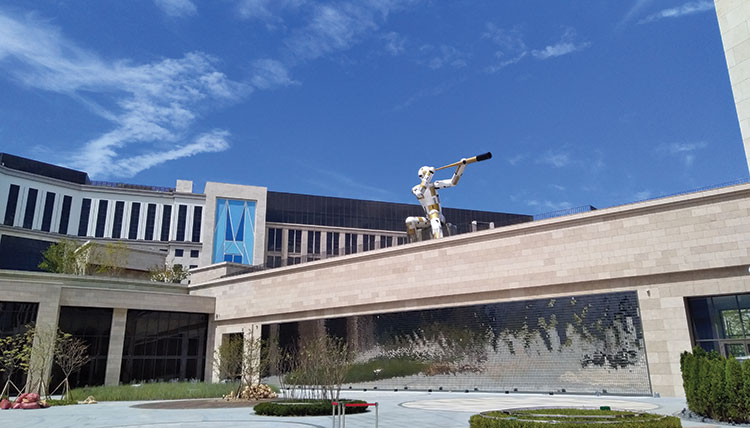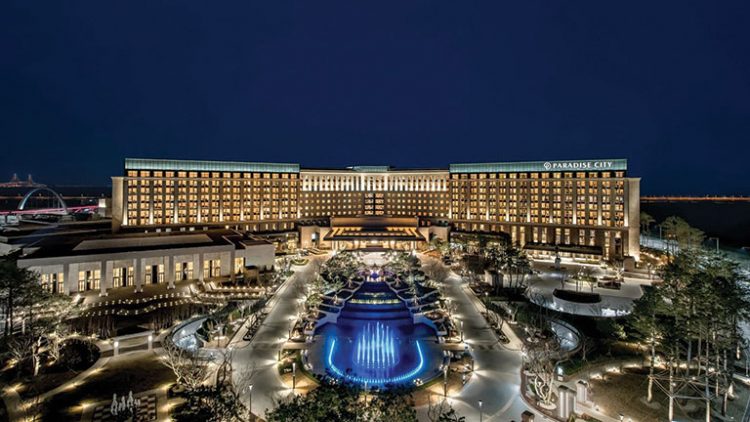The Korean peninsula’s initial integrated resort leans on art, airport and Japan ties to overcome “first mover disadvantage” and its foreigner-only casino restriction.
Nearly everyone agrees integrated resorts are the future of casinos in Korea, but a billion dollar price tag on foreigners-only casinos still gives pause. After opening into the teeth of a Chinese group travel boycott against South Korea nearly two years ago, KRW1.54 trillion (US$1.37 billion) Paradise City remains a work in progress and will have to wait at least another two years for any help from additional Incheon IRs.
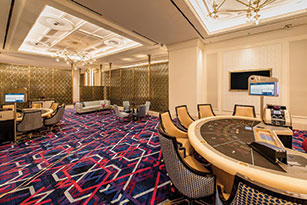 Morgan Stanley analyst Jay Lee has written that Paradise City faces a “first mover disadvantage,” though she sees majority owner Paradise Group turning a corner. That sentiment is not universal, but gaming stakeholders collectively hope IRs will establish the Seoul-Incheon area as a major gaming destination.
Morgan Stanley analyst Jay Lee has written that Paradise City faces a “first mover disadvantage,” though she sees majority owner Paradise Group turning a corner. That sentiment is not universal, but gaming stakeholders collectively hope IRs will establish the Seoul-Incheon area as a major gaming destination.
“The casino business has to change from pure gambling to more of a family oriented complex. That’s why the IR is here,” Paradise City President and CEO Park Pyung-yong says, recalling a late 1990s trip to Las Vegas with Paradise Chairman Phil-lip Chun that opened their eyes to the IR concept. “We think the casino business should be IRs, more tourist-oriented, not gambling-oriented. It should be more of a family enjoyment place.”
Paradise City, a 55-45 joint venture with Japan’s Sega Sammy operated by Paradise, checks those boxes. The self-proclaimed “art-tainment resort” opened in April 2017 with 711 room five-star Paradise Hotel, South Korea’s largest hotel convention space, family lounge Safari Park featuring bowling and video games, indoor and outdoor pools, a spa, plus Japanese, Italian, Chinese and Cantonese restaurants, a cafe and live music lounge. The IR showcases more than two dozen works by renowned artists including Damien Hirst, Anish Kapoor, Yayoi Kusama and Lee Yong-baek.
CHEAP SQUEEZE
On Paradise City’s main floor, players can squeeze their baccarat cards with wagers as low as KRW10,000 (US$8.88) and bet as little as KRW2,500 on roulette. Other games include blackjack – nearly as popular as baccarat – sic bo and poker games, including Texas Hold’em.
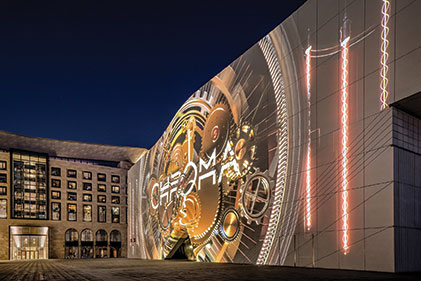
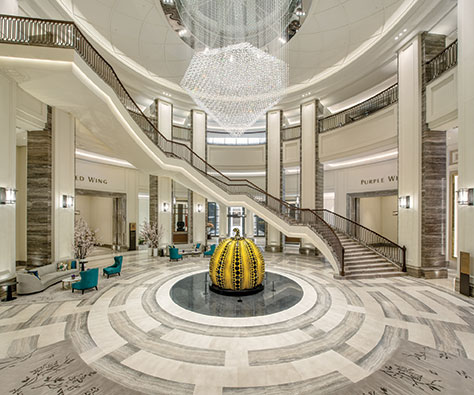
Korea’s largest foreigner-only casino covers 15,529 square meters (167,092 square feet), hosting 154 tables, 281 slot machines and 62 ETG terminals. VIP rooms include Sky Casino with a US$20,000 buy-in and three VVIP areas with US$5,000 minimum bets. Leading Macau junket promoter Suncity Group uses rooms at Paradise City and commissions reportedly exceed 1.6%.
VIP play comprised 86% of the KRW2.29 trillion total drop for Paradise City’s first full year of gaming operations, Paradise reports. Net gaming revenue topped KRW250 million. Those figured trailed KRW2.48 trillion drop and KRW295 million net revenue at Paradise Walkerhill in northeastern Seoul with 100 tables, 100 slots and 30 electronic gaming terminals crammed into 3,800 square meters rented in a hotel basement. Paradise City should overtake Walkerhill this year after increasing drop by 68% last year.
K-EUROPE?
Paradise City’s Phase 1-2, opened in September, adds attractions while doubling down on the art theme. Chroma, Northeast Asia’s largest nightclub at over 7,000 square meters (75,000 square feet), features two stages, Korean and international DJs and a year-round rooftop pool deck including cabanas with whirlpool spas. Cimer marries a “European art spa” to the traditional Korean jjimjilbang with a variety of pools, sauna and themed relaxation spaces. Indoor theme park Wonder Box is due to open by April.
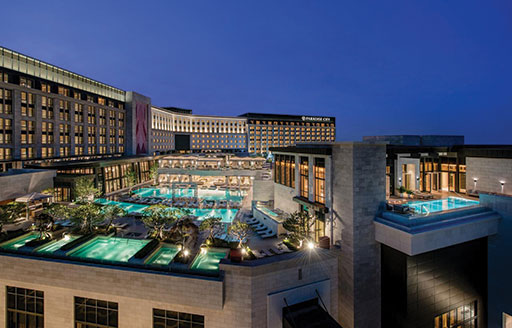 Boutique hotel Art Paradiso anchors The Plaza, an airy, sky lit space modeled after Florence’s Piazza della Signoria.
Boutique hotel Art Paradiso anchors The Plaza, an airy, sky lit space modeled after Florence’s Piazza della Signoria.
A “lifestyle design hotel inspired by European boutique hotels,” according to Paradise, Art Paradiso has 58 suites plus a high end contemporary Korean restaurant and “Amsterdam style” gastropub utilizing Korean ingredients. Paradise Art Space’s permanent collection boasts pieces by Hirst, American Jeff Koons and Koreans Lee Bae and Kim Hodeuk.
Now 90% occupied, The Plaza’s 20 retail and food outlets offer eclectic Korean and international specialties plus a duty free department store. “Visitation is getting better, but it is below our expectations,” Paradise Investor Relations Manager HyeJeong Shim says. “The impact and the synergy to Paradise City’s casino operations for Phase 1-2 is very limited so far.” She expects greater benefits during the year’s second half.
TURNING JAPANESE
Despite the slow ramp, Morgan Stanley’s Jay Lee in Seoul expects that completing Paradise City capital expenditures will return Paradise to positive cash flow for the first time since 2013. Moreover, the report, co-authored with Morgan Stanley Managing Director in Hong Kong Praveen Choudhary, notes Paradise has transitioned from Chinese VIPs to Japanese and others more successfully than rival Grand Korea Leisure (GKL), and Paradise City will likely attract Chinese VIPs when that market rebounds.
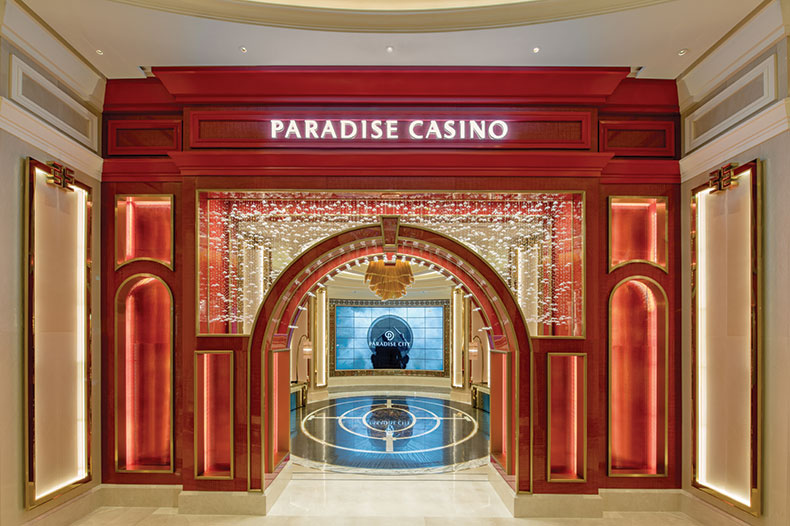 Founded in 2005 and controlled by the government’s Korea National Tourism Organization, GKL operates Seven Luck casinos at two prime locations in Seoul and one in Busan. GKL parlayed geography and a faster embrace of Chinese customers to overtake Paradise in the foreigner casino market a decade ago, but Paradise caught up. Paradise’s 2018 gaming revenue of KRW638 billion is 29% greater than GKL’s KRW493 billion, estimated by JP Morgan, and the gap will likely widen.
Founded in 2005 and controlled by the government’s Korea National Tourism Organization, GKL operates Seven Luck casinos at two prime locations in Seoul and one in Busan. GKL parlayed geography and a faster embrace of Chinese customers to overtake Paradise in the foreigner casino market a decade ago, but Paradise caught up. Paradise’s 2018 gaming revenue of KRW638 billion is 29% greater than GKL’s KRW493 billion, estimated by JP Morgan, and the gap will likely widen.
GKL’s Seoul casino floors have more buzz, but Morgan Stanley sees limited upside, since GKL shuns junket promoters – that could change – and doesn’t plan to build an IR after initially showing interest in an Incheon license.
Paradise City can better cater to premium players because it controls hotel rooms there. It says occupancy has improved to 70% on weekends, boosted by hocance, Korea’s term for stay-cation. But the domestic hocance market doesn’t help gaming revenue.
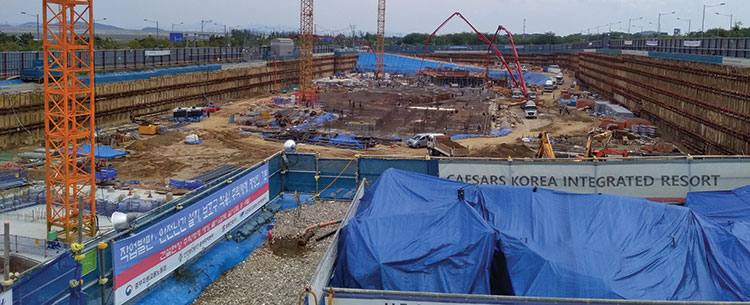
Incheon’s Free Economic Zone on Yeongjong Island fits the foreigner casino model because it’s on the doorstep of Incheon International Airport, gateway to increasingly popular Seoul, hub of K-Pop and K-Culture. With a second terminal completed in January last year, Incheon accommodated more than 68 million passengers after placing 19th in 2017 with 62 million. Shanghai, Beijing and Tokyo are all within two hours flying time – all closer to Incheon than Macau – and a quarter of the world’s population lives within 3½ hours. Express trains take 43 minutes to reach Seoul.
WHERE’S THE BULGOGI?
Not everyone is sold on Paradise City or Incheon. In a report, JP Morgan analyst DS Kim contends Phase 1-2’s KRW530 billion capital cost and KRW85 billion annual operating expense, KRW110 billion with depreciation, are “much too high” for the revenue it will generate.
Questions have also been raised about placing Art Paradiso’s premium rooms farthest from gaming, the absence of casino retail staples such as watch and jewelry shops and the lack of “Korean-ness” that Paradise promised to emphasize. It took 18 months for Paradise City to open a Korean barbecue restaurant. Except for occasional music videos on the casino bar’s gigantic screen, there are no hints of hallyu, the Korean cultural wave influencing Asia and beyond.
“On your first and second visit here [you might say], ‘Oh, it’s very luxurious. Looks like Las Vegas. Looks like Macau,’” Park says. “When you visit more, you’ll feel the Korean style in many places.”
Success for Incheon IRs may well depend on reaching critical mass. Caesars Korea began building its KRW850 billion twin tower project in September 2017, scheduled to open during the second quarter of 2021 in Midan City, about 15 minutes from the airport by car. Mohegan Gaming’s Inspire Entertainment Resort, at the opposite end of the airport from Paradise City, promises a Paramount Pictures theme park and 15,000 seat arena, extending its US partnership with Live Nation to provide entertainment for it. Mohegan aims to begin construction in May for a 2022 opening. “Bring them on,” Caesars President for International Development Steve Tight urges.
“The Korean integrated resort market is not defined at this time,” Steelman Partners CEO Paul Steelman, interior designer and architectural consultant for Inspire, says. “You need integrated resorts to compete in the region. Korea is just taking its first steps towards creating a series of resorts designed and constructed in the spirit of Las Vegas. Only then will the market be reinvented.”
“Incheon is the perfect place”
Paradise City operator Paradise Sega-Sammy President and CEO Park Pyung-yong also president of Paradise Group, spoke with Inside Asian Gaming Editor at Large Muhammad Cohen about key issues facing the Korean peninsula’s first integrated resort and the nation’s casino industry.
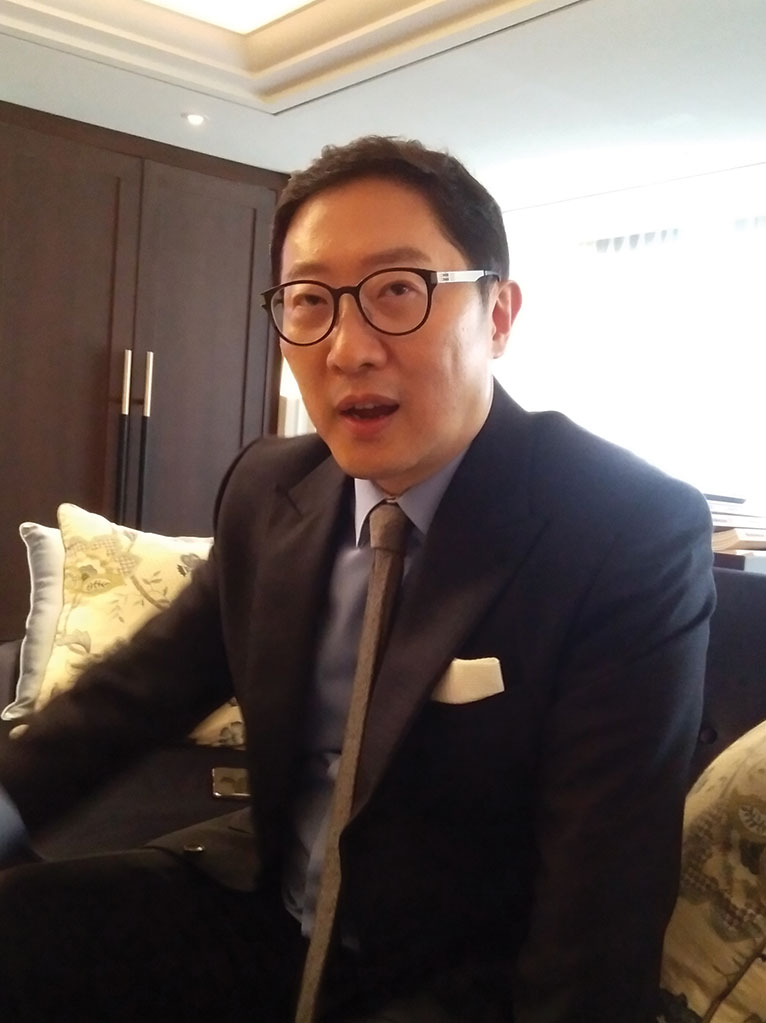 Muhammad Cohen: Paradise has casinos in Jeju, Incheon, Busan and Seoul. Why build the IR in Incheon
Muhammad Cohen: Paradise has casinos in Jeju, Incheon, Busan and Seoul. Why build the IR in Incheon
Pyung Yong Park: Actually regarding China, regarding Japan, Incheon is the perfect place. Five minutes from the airport, walking distance 10 minutes, by car two minutes.
Before, we had the casino at the [airport’s] Grand Hyatt. People might spend five hours gambling. After that, they think, “Oh, what else should I do?” But there’s nothing here. They have to go to Seoul. With the IR, we have everything: we have concerts, K-pop, restaurants, a shopping mall, duty free.
People come to South Korea for two purposes. Some people want to enjoy Korean culture, see sights. For that, they go to Seoul or to other places. If people enjoy gambling and something modern, they’ll get everything here. They don’t have to go to any other place.
MC: Are you anxious to see Caesars and Inspire open?
PYP: Actually, many of our staff worry about Caesars. I never think about this as a hurdle because a Korean IR should be more Korean style. Otherwise people will go to Macau, to Singapore. If we do Las Vegas style, we don’t have any advantage over Singapore and Macau. That’s why we focus on more Korean style.
MC: Do you expect the gaming pie to grow with more IRs?
PYP: Yes. The pie should be bigger. We experienced that when Seven Luck opened in 2005. For one or two years, we were effected very much, but after three or four years the pie got much bigger.
MC: How has Paradise responded to decreased Chinese visitor numbers?
PYP: Before [China’s group travel restrictions against South Korea], China represented more than 50% of the entire market, but I think that time is gone.
It’s a new Asian market now. We focus on Thailand, Mongolia, Malaysia, Taiwan, many places.
MC: Your figures show more business from Japan.
PYP: Yes. Before 2010, the Japan market was the biggest in Korea. Starting 2010-2011, [Japan and China] are half-half. After that, maybe 2015 or 2016, the China market has more than doubled Japan. But now, I think the Japanese economy has recovered.
Also, Paradise City is a joint venture with [Japan’s] Sega Sammy. We own 55%, Sega Sammy owns 45%. Sega Sammy also is a gaming business, but not a casino business, but it’s very similar. They are very good at marketing and [have] market power there. They have helped a lot, so there’s good synergy.
Also, Sega Sammy is trying to open a casino in Japan.
MC: Is Paradise considering a joint venture with Sega Sammy in Japan?
PYP: Yes. It’s not a commitment, but it’s some of kind of sentiment. But it’s not confirmed.
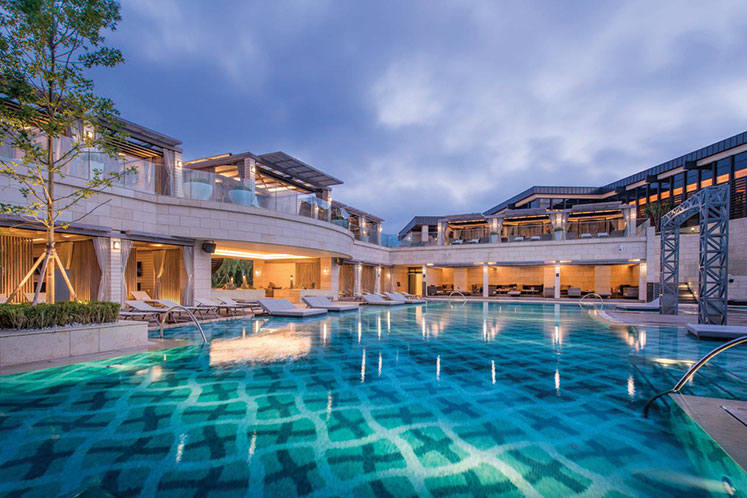 MC: How will Japan IRs impact casinos in Korea?
MC: How will Japan IRs impact casinos in Korea?
PYP: Some people think Japanese high rollers may not come to Korea. But Japanese high rollers may be very cautious about their playing. I think Japanese high rollers won’t go to their local casino. Our VIP clients in Japan will still come to Korea.
MC: Do you expect open casinos [where Koreans can play] after 2025 when Kangwon Land’s exclusivity expires?
PYP: It depends on Kangwon Land’s situation. Also it depends on Japan. When Japan opens casinos, the focus will move to Japan. Korean high rollers [may] go to Japan, and the Korean government [may be] very angry.
MC: If there are open casinos, is Paradise ready?
PYP: I cannot say. If I say ready, people think we are [lobbying] for it. I’m Korean Casino Association chairman, so I represent all the casinos. So I’m very neutral.
MC: Would open casinos be good for the industry?
PYP: Yes, definitely it would be good for the industry, but I’m not sure if it would be good for the country.
